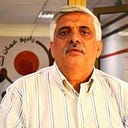Palestinian humanity reflected in “Daybreak in Gaza”
By Daoud Kuttab
When the Israeli revenge war, which turned into what South Africa has called a genocidal war, I tried to avoid television and video coverage of the carnage. So, when I began reading Day Break in Gaza, I again put the book down to avoid dealing with words that depicted the same video scenes that I avoided. But somehow, I would find enough courage to return to this wonderful book to find stories, testimonials, and images that I realized needed to be heard and seen.
Once I overcame my original hesitancy I discovered the book’s genius of confronting the dehumanization process of the Israeli occupiers and the absent world media which worked overtime in an ugly dehumanization campaign that in the words of the Israeli army chief are “animals” and “that there are no civilians among them” as Israel’s so-called moderate president stated.
Daybreak in Gaza reflected a concept that I have been training journalists, including fellow Gaza journalists for some time. Ansant al Ilam (Humanizing the media) or what is referred to in Western media as human-interest stories are often missing in Arab media coverage which tends to overemphasize the carnage and has fallen into the trap of dealing with numbers rather than in human stories.
Daybreak in Gaza weaves in 336 gripping pages, stories, and testimonials both since October 7th and since time immemorial. Stories of musicians and photographers are intertwined with professors, and translators, poets and athletes, women activists, legal experts, medical personalities. Stories by journalists, novelists, women backing and men creating jewelry all are told in short warm, and moving personal stories or as subjects of human-interest stories or experts from their own diaries and writings.
I found Daybreak in Gaza illumination about the deep history of Gaza (the district and not just the Strip) that dates back to millennials. From the historic fourth-century church in Gaza City to the biblical and Koranic mentions are all related to historical site details that are neither boring nor over academic.
Mahmud Muna writer, publisher, and owner of the educational bookshop in Jerusalem combined with the BBC’s Mathew Teller known in Palestine for his wonderful book The Nine Quarters of Jerusalem to produce a wonderful colorful, and moving manuscript published by the London-based Saqi publishers. They tackled Gaza the way a museum curator deals with presenting a complex historic era, except they were dealing with the continuous presence in Gaza.
Daybreak in Gaza is anchored in Palestine’s southern district, but it is not restricted to a single geographical area. Every story has a Gaza anchor but can be as far away as California or Dubai but always full of colorful memories and yearning for the sea and life in this narrow physical territory full of wonderful tales.
I found some of the most powerful testimonials of those trying to get into or out of Gaza like Jerusalemite Izzedine Bukhari’s attempts to get his sister’s favorite cat Lulu with him as he barely made it to her wedding in Gaza, or the $56,500 it cost Mohammad Aghalkurdi to be able to evacuate from Gaza to help treat his ailing sister.
While some of the writers of the stories and testimonials have since been killed, the power of this book rests in the stories of people who have survived and have refused to be broken regardless of how hard the occupiers tried like the story of Qudaih. He worked as a translator for CNN and the troubles that he encountered before October 7th just to get to the US consulate in Jerusalem for an interview to study in the US, including scaling the 10-foot-high Israeli fence. His bio tells us that one hundred members of his extended family including twenty-four cousins were killed by Israel since October 7th.
The resilience of Palestinians may be best captured by what Yousef Alkhouri said about how the world has viewed Palestinians, especially Gazans:
“We have been misrepresented as bloodthirsty, illiterate terrorists, but we are not. We are a beautiful, life-loving, caring community that will host you, feed you, and protect you. The world needs Gazans — people who refuse to give in to despair, and who will always find a way to prevail. You cannot erase Gaza. You can occupy Gaza, you can destroy Gaza, but you will never take it away from us. It’s the same as in 1948 when the colonizers tried to erase Palestine from our memory and failed. Now they are trying again. We will not give up. We will not give in. We will always rebuild Gaza — in our memories, in our imaginations, and in our hearts, until one day we will rebuild Gaza for real.”
*Daoud Kuttab is an award-winning Palestinian journalist. His latest book State of Palestine NOW is available on Amazon books
